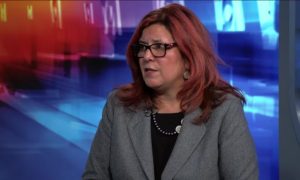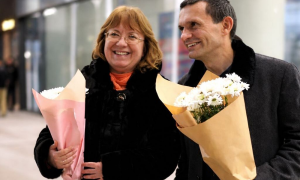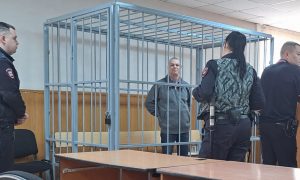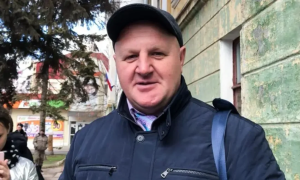Russian prosecutors are trying to ban the Jehovah’s Witness New World Bible as “extremist”, Forum 18 notes. However, a Pervouralsk court refused to ban two Islamic texts citing the Koran as “extremist”, in the first use of a legal amendment protecting some sacred texts.
Prosecutors in Russia’s Leningrad Region are attempting to have the Russian-language Jehovah’s Witness edition of the Bible outlawed as “extremist”, despite the fact that a recent amendment to the Extremism Law explicitly prohibits the banning of “the Bible, the Koran, the Tanakh and the Kanjur, their contents, and quotations from them”. A court in Pervouralsk in Sverdlovsk Region, however, has refused prosecutors’ requests to have two Islamic texts banned as “extremist”, on the grounds that they cite extracts from the Koran. This appears to be the first instance of this amendment being used to prevent an “extremism” ruling (see below).
But a Moscow court has refused to consider the Theravada Buddhist community’s legal challenge to the Federal Service for Supervision of Communications, Information Technology, and Mass Media (Roskomnadzor) order to remove from a Buddhist website a verse of the Theravada Pali Canon. It offered an allegedly “detailed description of suicide”. Theravada Buddhists nevertheless consider it an integral part of their canonical texts (see below).
Four thousand copies of the Jehovah’s Witness New World Bible in Russian and Ossetian were among more than 10 million items of literature impounded by customs officials on the border with Finland on several occasions in 2015, Forum 18 notes, even though no formal decision has been taken ruling any part of this Bible “extremist” (see F18News 14 December 2015http://www.forum18.org/archive.php?article_id=2133). Jehovah’s Witnesses in Russia are continuing to challenge these seizures in the arbitration courts.
Increased repression of freedom of religion or belief
The attempted ban on the New World Bible is taking place in a climate of increased law enforcement agency repression of Jehovah’s Witness individuals and communities exercising freedom of religion or belief.
2015 saw a significant increase in convictions of Jehovah’s Witnesses for the distribution of “extremist” materials (see F18News 25 April 2016 http://www.forum18.org/archive.php?article_id=2171). Three Jehovah’s Witness communities are trying to challenge lower court orders that they be liquidated as “extremist” and are awaiting Supreme Court decisions. The cases brought to six the number of their communities banned as “extremist”. Court moves to liquidate a seventh were launched in May 2015. Since spring 2015 at least seven further Jehovah’s Witness communities have received written “extremism” warnings from prosecutors, a frequent prelude to liquidation suits (see F18News 22 March 2016http://www.forum18.org/archive.php?article_id=2161).
On 2 March, the General Prosecutor’s Office issued the Administrative Centre of Jehovah’s Witnesses in Russia with a warning “that engaging in extremist activity is not permitted”. It advised that “practical and organisational measures” must be taken within two months (by 2 May) or the entire Jehovah’s Witness association will be liquidated (see F18News 25 April 2016 http://www.forum18.org/archive.php?article_id=2171).
Federal List of Extremist Materials
Any Russian court can declare a work (eg. a book, leaflet, song, slogan, video, website or webpage) “extremist”. The Justice Ministry must then place such a work on its Federal List of Extremist Materials. The Federal List now runs to nearly 3,500 items, often does not include full bibliographical details, and is irregularly updated. Checking whether a particular item is on the List can be very difficult or even impossible. The removal of an item from the Federal List is rare and can be short-lived. In recent years, new titles have been added at an increasing rate (see F18News 27 July 2015 http://www.forum18.org/archive.php?article_id=2084).
From 23 November 2015, an amendment to the Extremism Law stops some, but not all, sacred texts – “the Bible, the Koran, the Tanakh and the Kanjur, their contents, and quotations from them” – from being ruled “extremist” and placed on the Federal List (see F18News 30 November 2015 http://www.forum18.org/archive.php?article_id=2126).
Although Jehovah’s Witness and Islamic literature form the bulk of religious items which appear on the Federal List, the publications of other religions may also sometimes fall foul of the vaguely defined Extremism Law. In 2012, an attempt in Tomsk to ban “The Bhagavad Gita As It Is”, a key text for Hare Krishna devotees, was unsuccessful after a public outcry both locally and in India (see F18News 21 March 2012 http://www.forum18.org/Archive.php?article_id=1682). Several items of literature of the Chinese spiritual movement Falun Gong have also been banned, including, in 2001, its core spiritual text “Zhuan Falun” (see F18News 14 December 2012 http://www.forum18.org/archive.php?article_id=1782).
New World Bible ban?
On 26 April, Judge Roman Petrov of Vyborg City Court suspended the consideration of the Leningrad-Finland Transport Prosecutor’s request to have the Jehovah’s Witness New World Bible and other literature banned as “extremist”, and ordered further “expert analysis” to be performed. It is unknown when proceedings will resume.
The repeat analysis is to be carried out by the “experts” who originally found signs of “extremism” in the materials, the Administrative Centre of Jehovah’s Witnesses pointed out in a press release on 29 April. It claimed that Natalya Kryukova, Director of the Centre for Socio-Cultural Analysis, suggested that the New World Bible was “extremist” simply because it contains mentions of other texts which are already on the Federal List.
The Administrative Centre complained that lawyers for the Russian, Finnish, and German Jehovah’s Witness organisations (all of whom are “interested parties” in the suit) were not permitted to submit objections to the appointment of “experts”. They have also so far been prevented from offering evidence that the Jehovah’s Witness edition of the Bible is covered by the latest legal amendments preventing “the Bible, the Koran, the Tanakh and the Kanjur, their contents, and quotations from them” from being banned. Judge Petrov has turned down one formal challenge to this situation from the lawyers and has so far ignored a further two.
The Centre for Socio-Cultural Analysis has been registered in Moscow since 2014, and appears to comprise four “experts” with backgrounds in art history, mathematics, languages, and political science and religious studies. According to their website, they offer, among other services: “the identification in text and images .. of the promotion of extremist activity and direct, indirect and hidden calls to extremism; the determination of extremism in the activities of organisations; and the identification of signs of forced involvement in an organisation whose activities bears signs of extremism”.
The Centre states it works with law enforcement and judicial bodies, as well as unspecified other organisations and individuals. In 2015, it produced analysis of two Jehovah’s Witness texts which were then banned as “extremist” in Kurgan, although this ruling has now been overturned by a higher court (see below).
Forum 18 asked Kryukova on 5 May about her Centre’s examination of the Jehovah’s Witness Bible and what signs of “extremism” it had found in the text, but she responded: “Because work on this case is still under way, I do not consider it possible to give such an explanation”.
Forum 18 wrote to the press service of the North-Western Transport Prosecutor’s Office (of which the Leningrad-Finland Transport Prosecutor is a subsidiary) on 28 April to ask why the New World Bible and the other impounded literature was considered dangerous and how it would be possible to ban the former as “extremist” in the light of the recent amendment to the Extremism Law. Spokeswoman Natalya Orlova explained on 29 April that all questions must be submitted by post, by fax, or via the Prosecutor’s Office website. Forum 18 submitted an online enquiry the same day and received an automated acknowledgement, but no response to its questions as of the middle of the Leningrad Region working day of 5 May.
Forum 18 asked Vyborg City Court in writing on 29 April whether the lawyers would have the opportunity to challenge the claims by the Prosecutors and “experts”, and how a ban on the New World Bible would be possible after the amendment of the Extremism Law. No reply has been received as of the middle of the Leningrad Region working day of 5 May.
Appeals against customs seizures underway
The 4,000 New World Bibles (in Russian and Ossetian) and other Jehovah’s Witness brochures under threat of prohibition in Vyborg are among some 10 million items impounded by Russian customs on the Finnish border during 2015 (see F18News 14 December 2015 http://www.forum18.org/archive.php?article_id=2133).
Since March 2015, all attempted shipments of Jehovah’s Witness literature have been blocked, Jehovah’s Witness spokesperson Ivan Belenko told Forum 18, “with no reason, no legal right and no court ruling”, on the grounds that they are “supposedly goods supposedly prohibited from being imported into the territory of the Russian Federation”.
Jehovah’s Witnesses’ Russian and Finnish branches continue to try to have the customs officials’ actions declared unlawful. Cassational appeals in two suits will be heard at the North-West District Arbitration Court on 11 May and 8 June. These relate to two separate shipments of literature which should have entered Russia through the Svetogorsk border crossing in Vyborg District. St Petersburg and Leningrad Regional Arbitration Court initially rejected both suits on 1 September and 3 November 2015 respectively. Jehovah’s Witnesses challenged these decisions at the 13th Arbitration Court on 14 January and 16 February 2016, but were unsuccessful.
Leningrad-Finland Transport Prosecutor’s Office has consistently refused to answer Forum 18’s questions, by telephone and in writing, about why the imports were blocked simply because they might or might not contain signs of “extremism”.
In a press statement of 16 July 2015, Jehovah’s Witness Administrative Centre chair Yaroslav Sivulsky called the block on importing Bibles “the apotheosis of a mindless, unprofessional, and frenzied struggle with imaginary ‘extremism'”.
Reprieve for two Jehovah’s Witness texts in Kurgan?
Judge Svetlana Timofeyeva of Kurgan Regional Court has overturned a lower court decision which had ruled that two Jehovah’s Witness brochures were “extremist” and should be banned. No written verdict has yet been made public.
The Regional Court halted proceedings in the Watchtower Society’s appeal on 14 January and ordered further “expert analysis” by the Moscow Research Centre, Jehovah’s Witness spokesperson Belenko told Forum 18 on 19 April.
The case resumed on 14 April, according to the court website. On 28 April Judge Timofeyeva ruled that the original verdict should be “overturned in its entirety with the adoption of a new decision”. Telephones at the Civil Cases Department of Kurgan Regional Court went unanswered when Forum 18 called on 4 and 5 May to ask for further details of the verdict.
The two texts – “Keep Yourselves in God’s Love” and “Receive God’s Spirit, Not the World’s” – were initially declared “extremist” by Kurgan City Court on 1 September 2015 (see F18News 21 September 2015 http://www.forum18.org/archive.php?article_id=2103). Kurgan City Prosecutor’s Office claimed that they incited “religious hatred and enmity towards people who are not part of the Jehovah’s Witness religious organisation”, according to a 4 September 2015 press release.
Neither text has been added to the Federal List of Extremist Materials.
Koranic quotations save two books from “extremism” ban
In what appears to be the first application of the November 2015 Extremism Law amendments, Pervouralsk City Court rejected the city Prosecutor’s request to have two Islamic books outlawed as “extremist”, citing the fact that they both contained quotations from the Koran. This is despite the fact that the amendment refers only to quotations themselves, not specifically to the books which contain them.
Judge Natalya Kukushkina refused the Prosecutor’s suits in relation to “Is the Doctrine of the Trinity Divinely Inspired?” and “Selected Hadith” on 3 and 11 December 2015 respectively, according to the court website. The Prosecutor’s Office appealed unsuccessfully against the rulings on 15 March 2016 at Sverdlovsk Regional Court.
FSB security service “linguistic specialist” Svetlana Mochalova claimed in her December 2014 analysis of the texts, seen by Forum 18, that they both promoted “the religious superiority of Islam over other religions” and incited “religious hatred and enmity towards non-Muslims” (see F18News 8 June 2015 http://www.forum18.org/archive.php?article_id=2071).
Mochalova’s “analyses” have also been used to ban Jehovah’s Witness texts as allegedly “extremist” (see F18News 27 March 2013 http://www.forum18.org/archive.php?article_id=1818).
According to the written verdicts and appeal verdicts seen by Forum 18, unnamed “religious and psychological experts” came to similar conclusions to Mochalova about the “Selected Hadith”. However, these “experts” could find no indications of degradation of human dignity in relation to race, nationality, or social or religious affiliation. “Is the Doctrine of the Trinity Divinely Inspired?” did not, according to the “experts”, contain “information about the superiority of Islam over other religions which meets the criteria of extremist information”.
Judge Kukushina decided that Prosecutors had “not submitted valid, reliable and sufficient evidence in support of their arguments for the extremist nature of the material”, and concluded by citing the text of the November 2015 amendment to the Extremism Law (see F18News 30 November 2015 http://www.forum18.org/archive.php?article_id=2126).
Appeal Judge Svetlana Morozova also cited the amendment and pointed out the Koranic quotations in upholding the original rulings on 15 March.
Lawyer Ruslan Ishanov, representing the Kazyyatskoye Administrative of Muslims, told islamnews.ru on 10 January that the amendment was “the decisive argument in the case”.
Ilhom Merazhov, an Islamic scholar from Novosibirsk who participated as an expert witness in the case, commented to Forum 18 on 28 April that the verdict was “a good result, but as a participant in this process I can say that this is not the result of an independent judiciary. This is a directive from above”.
Law enforcement officials confiscated the two books from the Sabr community’s mosque in Pervouralsk during an “anti-extremism” inspection in 2014. The city Prosecutor’s Office submitted its request to have them banned in March 2015 (see F18News 8 June 2015 http://www.forum18.org/archive.php?article_id=2071).
“Selected Hadith” is a Russian translation of several hundred sayings attributed to the Prophet Mohammed and compiled by Muhammad Yusuf Kandahlawi (1917-1965), an Indian-born Islamic scholar and a major figure in the Tabligh Jamaat movement, which is banned as an “extremist” organisation in Russia. The Russian-language version of “Is the Doctrine of the Trinity Divinely Inspired?”, by Muhammad Ameen Cave, was first published in English in 1996 and seeks to disprove the Christian doctrine of the Trinity.
In May 2015, Judge Kukushkina ordered a repeat analysis of the books and ruled that the Sabr Muslim community should pay for it. The community and its parent organisation, the Kazyyatskoya Administration of Muslims, appealed unsuccessfully against this obligation and the appointment of FSB security service “experts” to perform the analysis (see F18News 21 September 2015 http://www.forum18.org/archive.php?article_id=2103).
Theravada Buddhist commentary still removed from website
A Moscow court has refused to consider the Theravada Buddhist community’s legal challenge to the Federal Service for Supervision of Communications, Information Technology, and Mass Media (Roskomnadzor), which had ordered the removal from a Buddhist website of a verse of the Theravada Pali Canon which offered an allegedly “detailed description of suicide” (see F18News 30 November 2015 http://www.forum18.org/archive.php?article_id=2126).
Tagansky District Court had returned the documents (submitted on 18 December 2015) because “all necessary conditions for submission had not been fulfilled”, a Theravada Buddhist spokesperson told Forum 18 on 22 April. The spokesperson explained that the new court procedural code, introduced in 2015, contains “many shortcomings, therefore it is difficult to comply with all requirements”.
The period for resubmission has now passed and the Roskomnadzor decision has come into force, so the community has decided not to try again, but to approach the Federal Service for Supervision of Consumer Rights Protection (Rospotrebnadzor), which originally requested the removal order.
Roskomnadzor’s order of 19 September 2015 referred to a passage – the 23rd sutta (“teaching”) of the 4th Nikaya (“collection” or “volume”) of Theravada scriptures – which describes how a monk “uses the knife” after repeatedly “[falling] away from temporary liberation of mind”, with notes explaining that this is a common euphemism for suicide. Roskomnadzor later amended this to refer only to the commentary, which Theravada Buddhists nevertheless consider an integral part of their canonical texts. (END)





